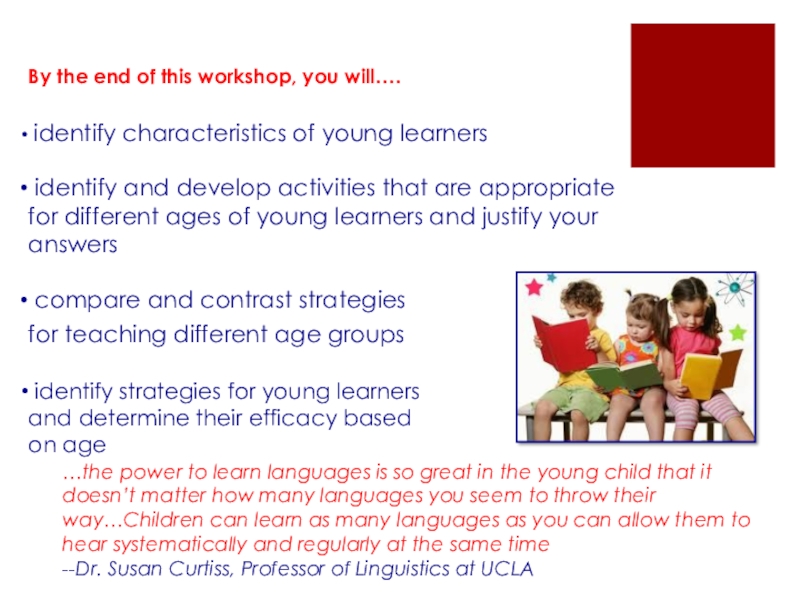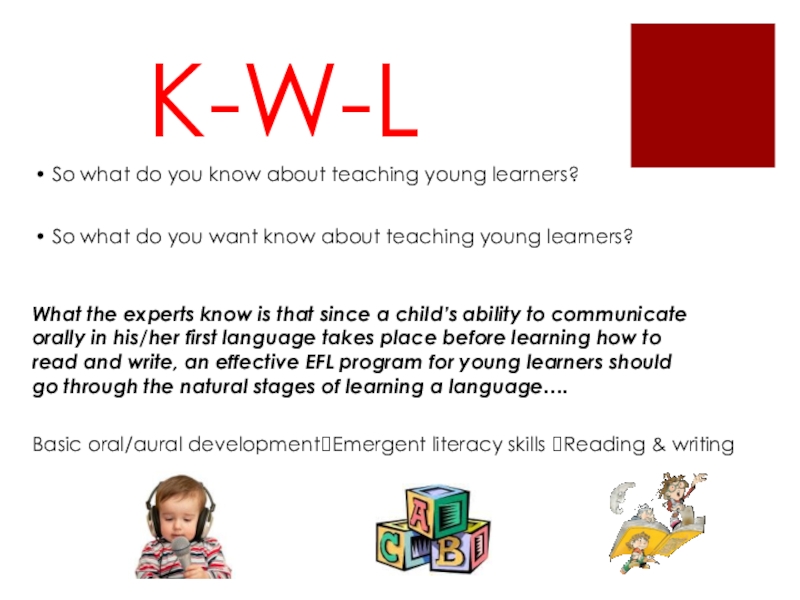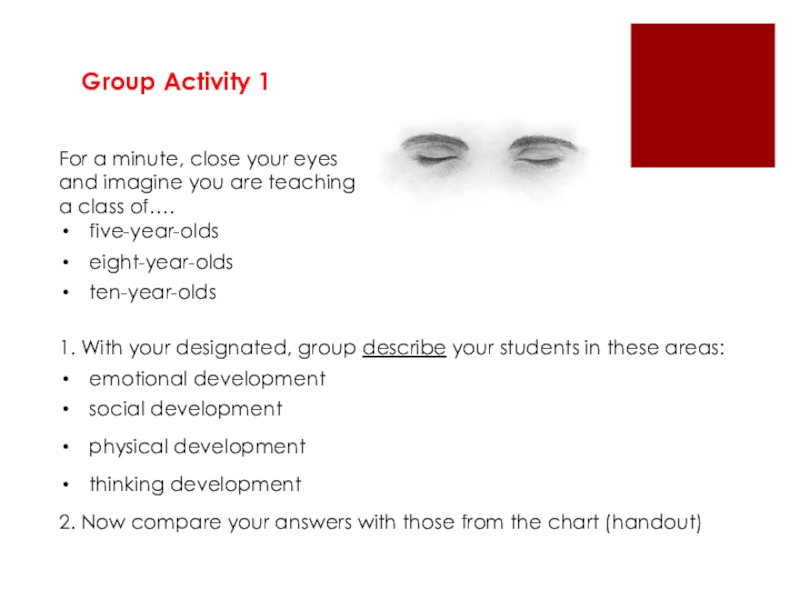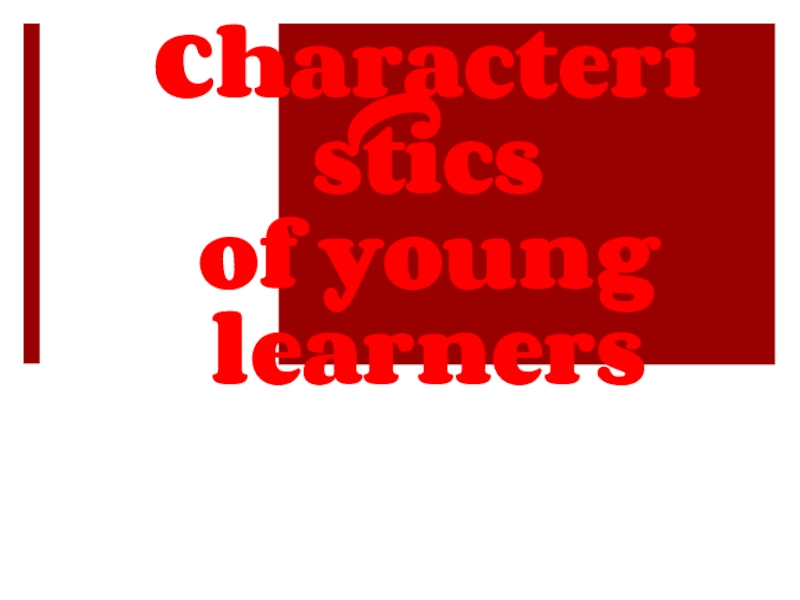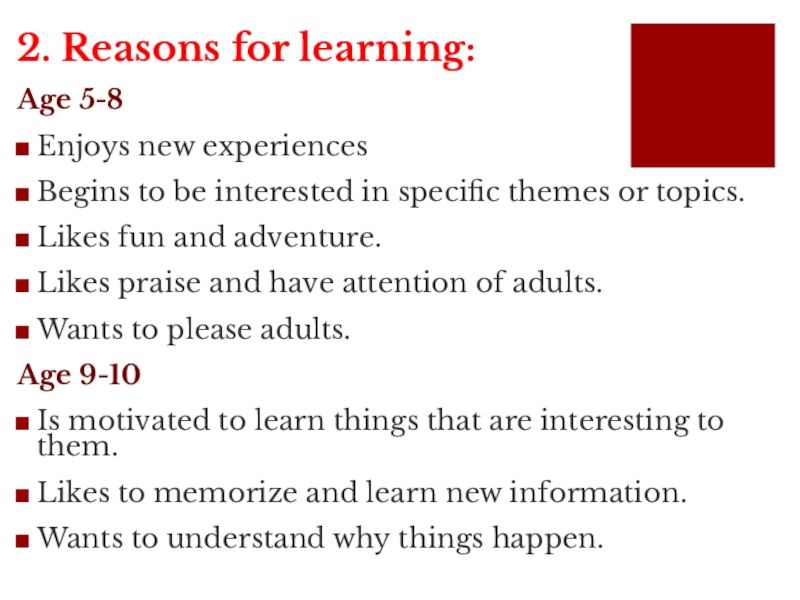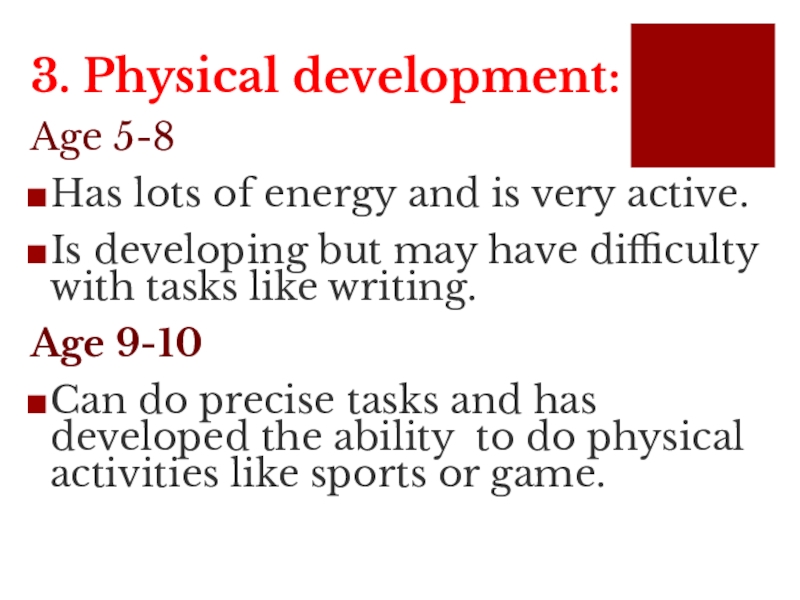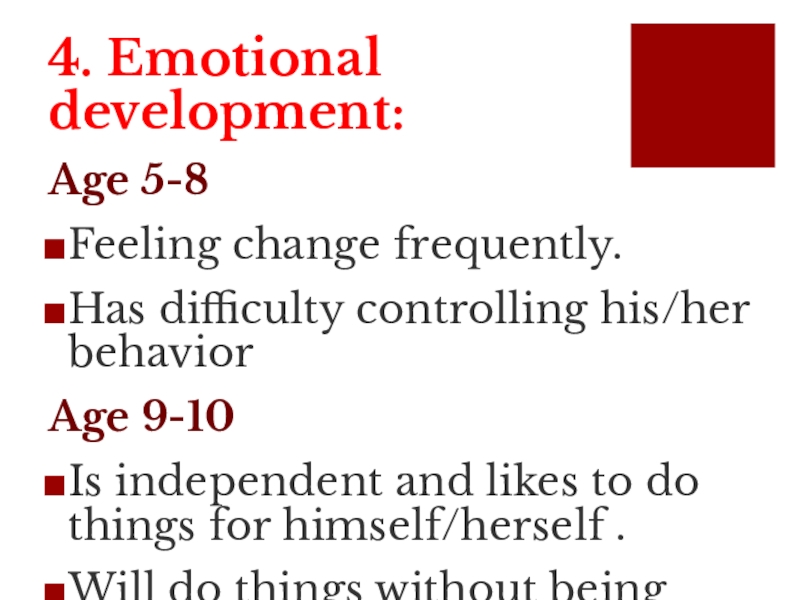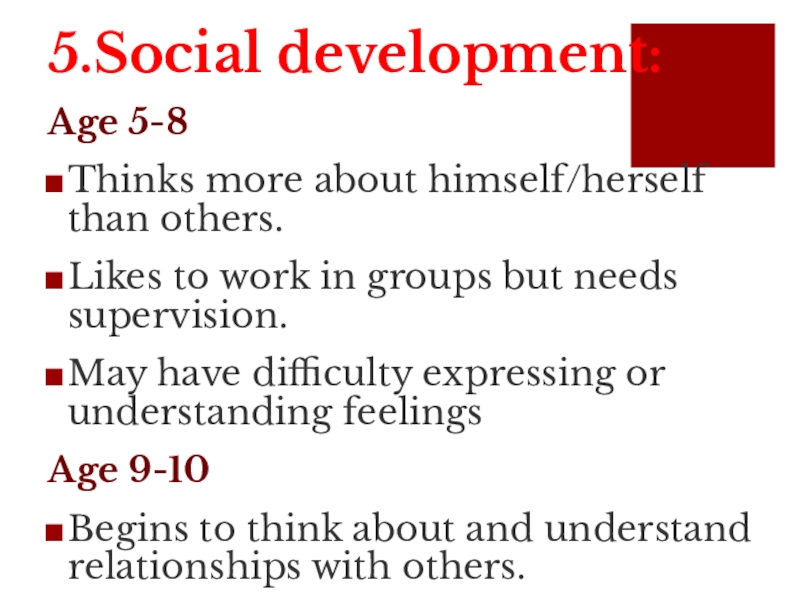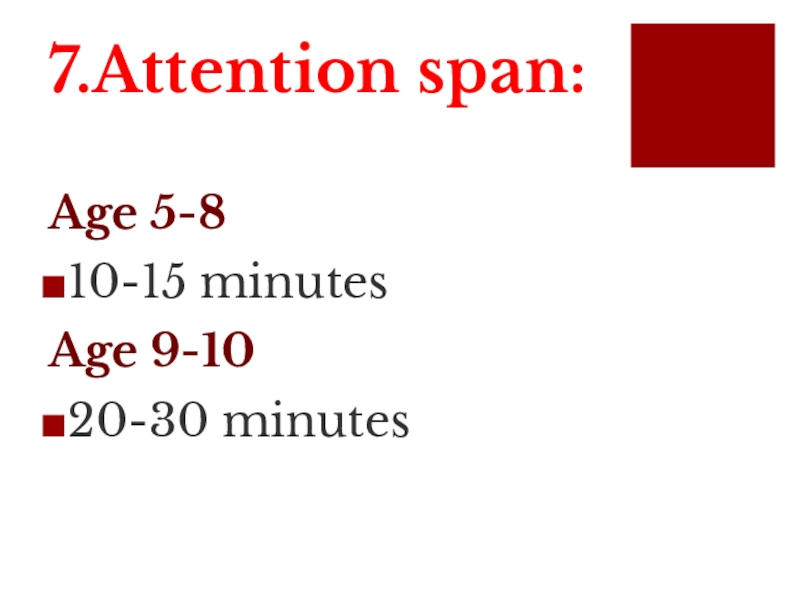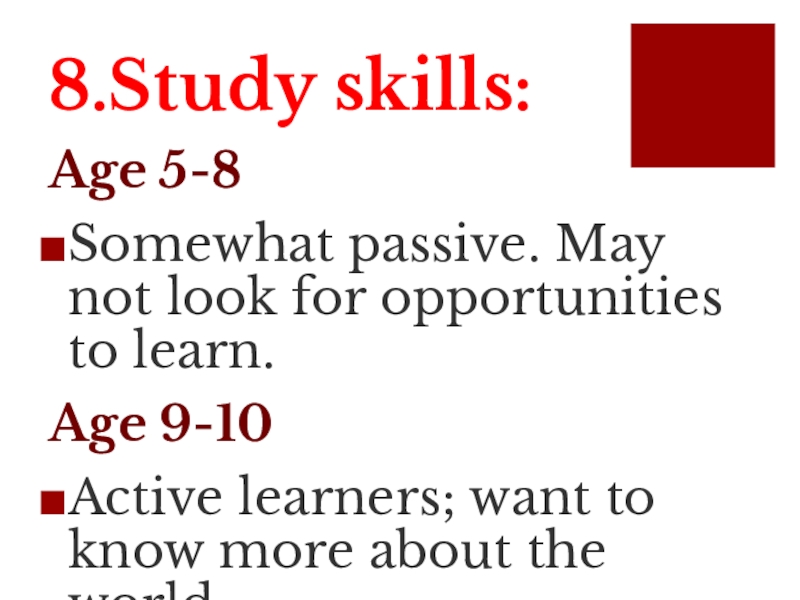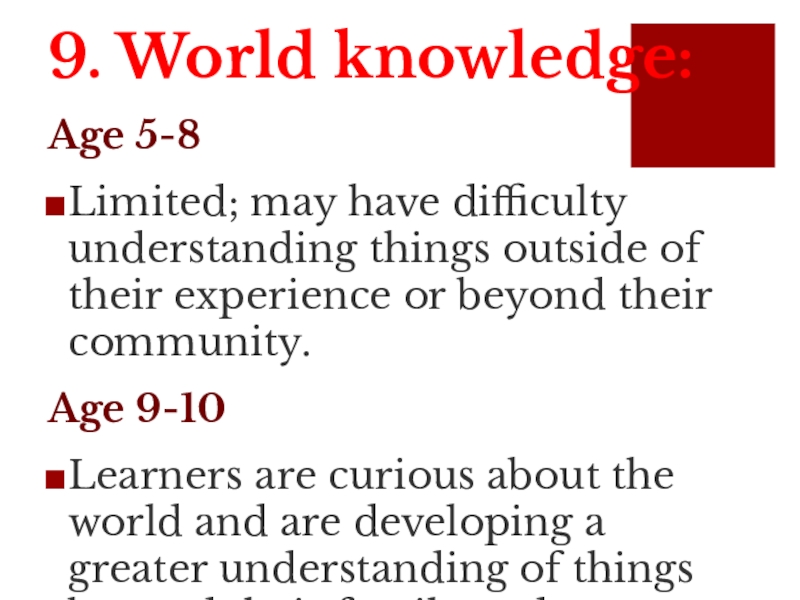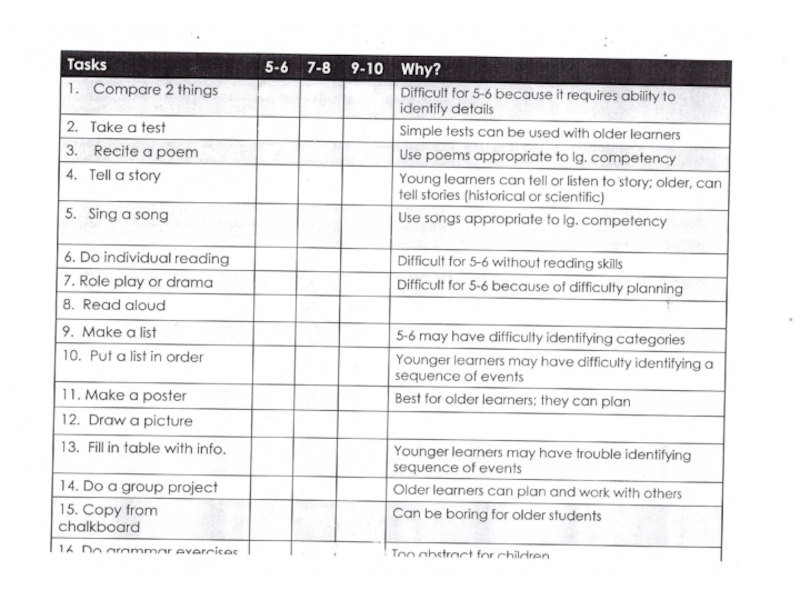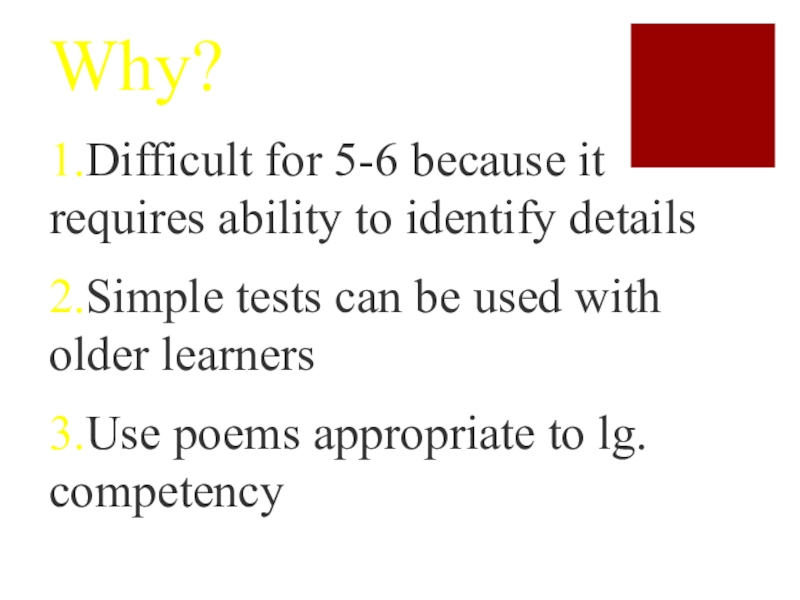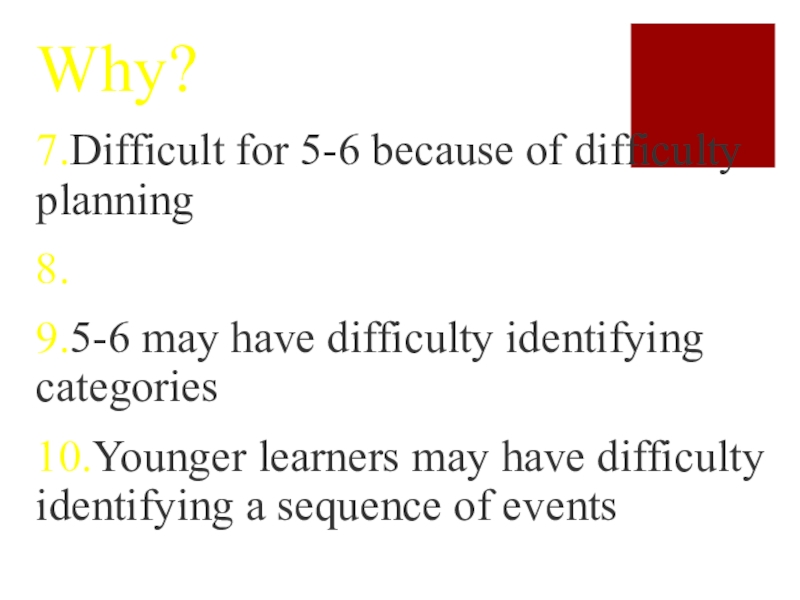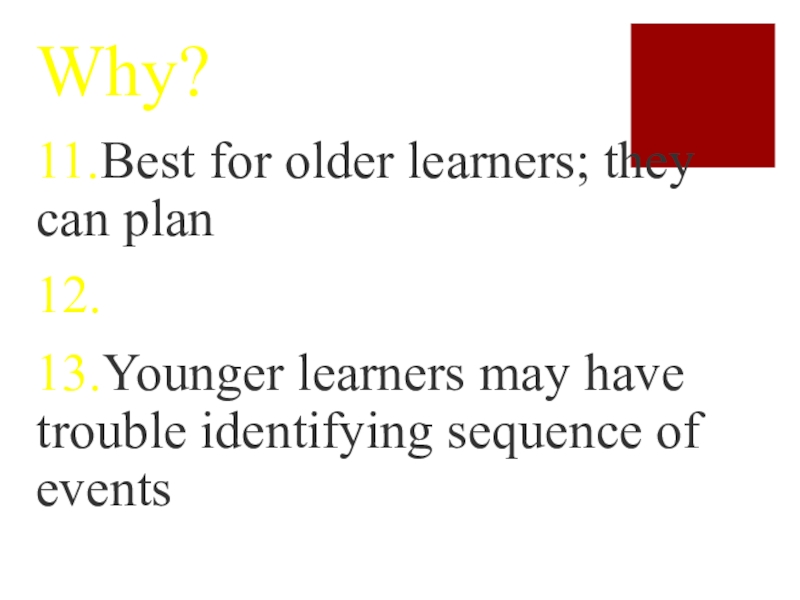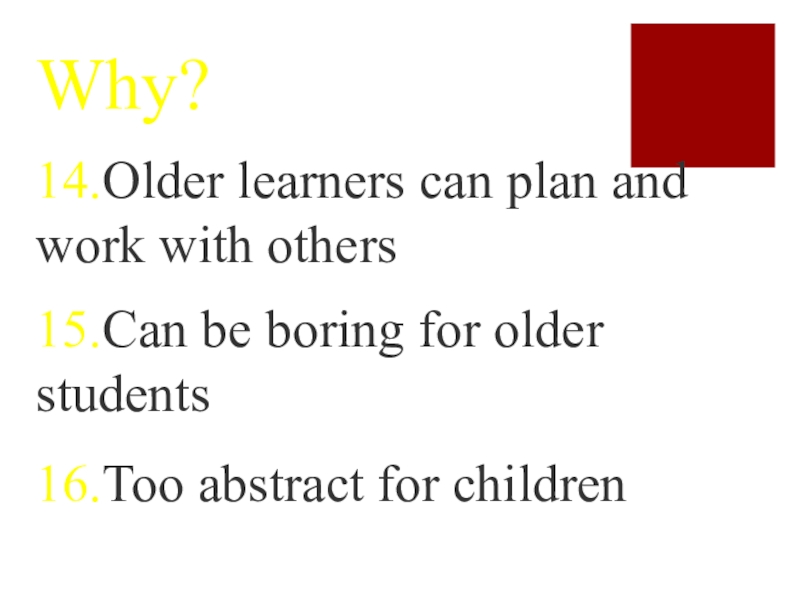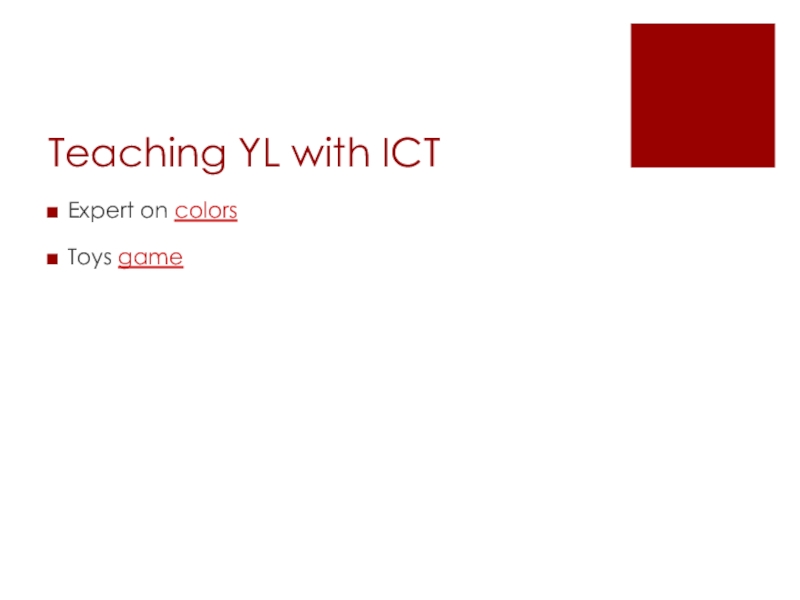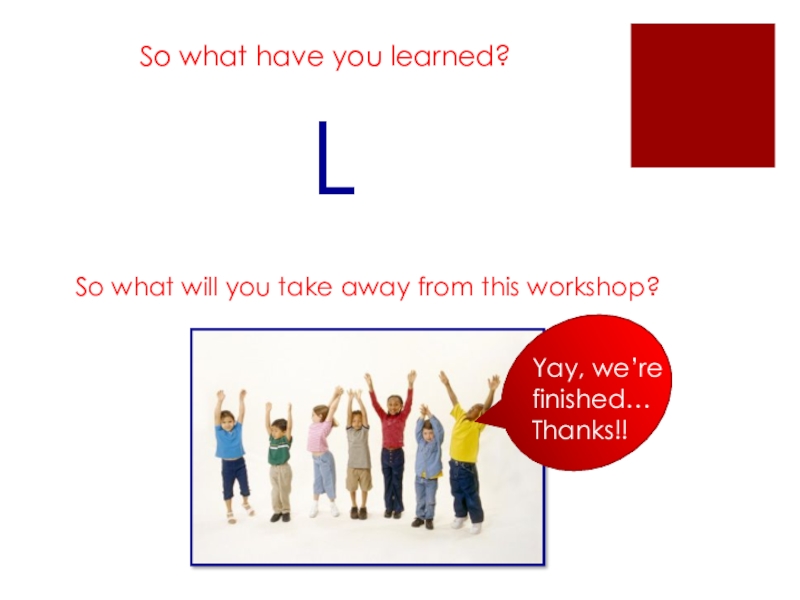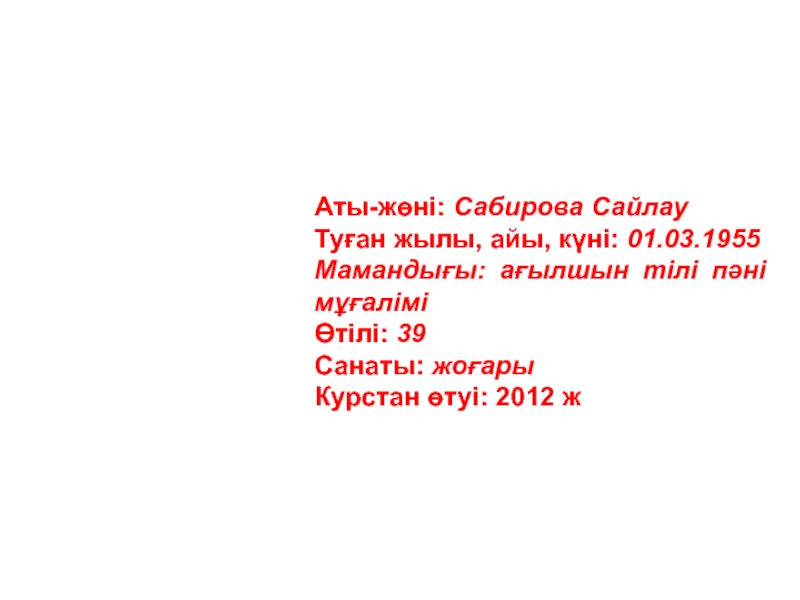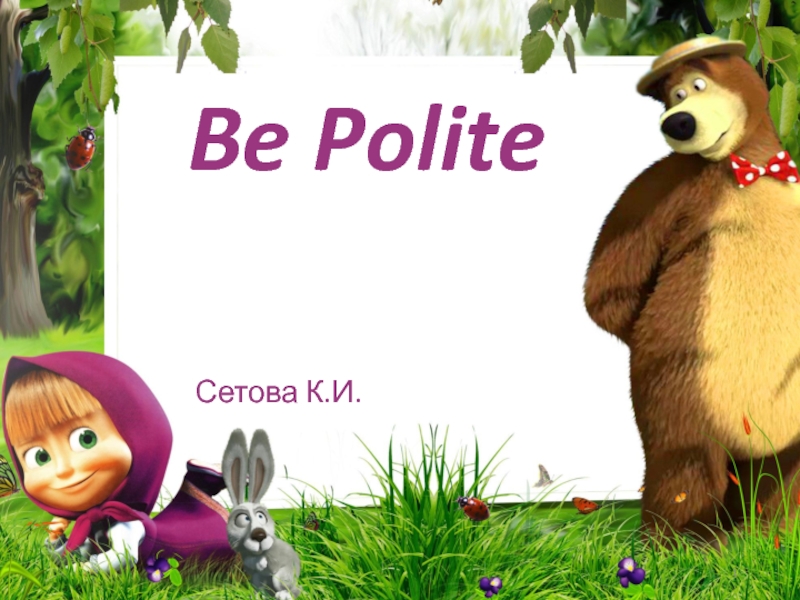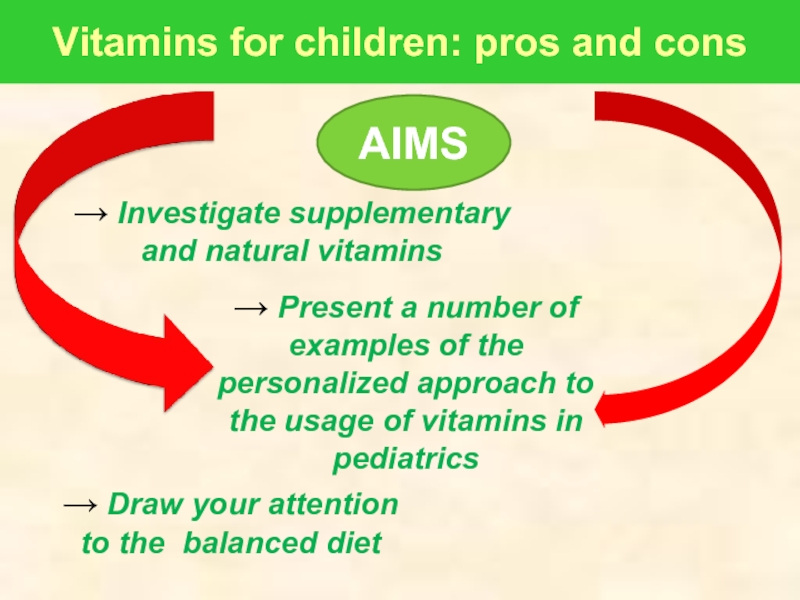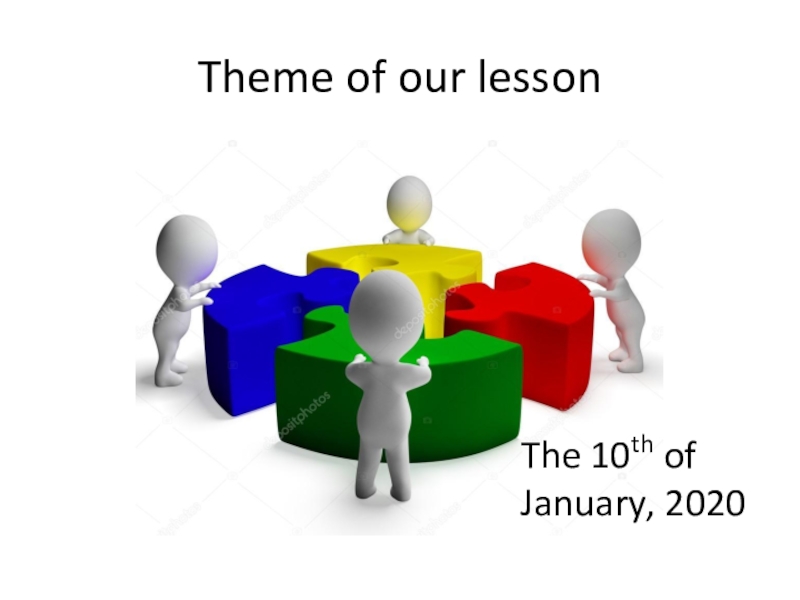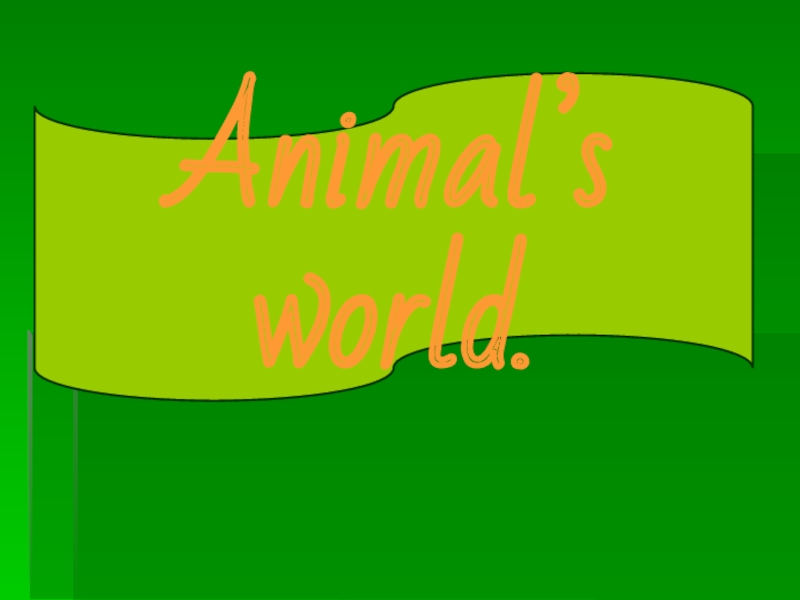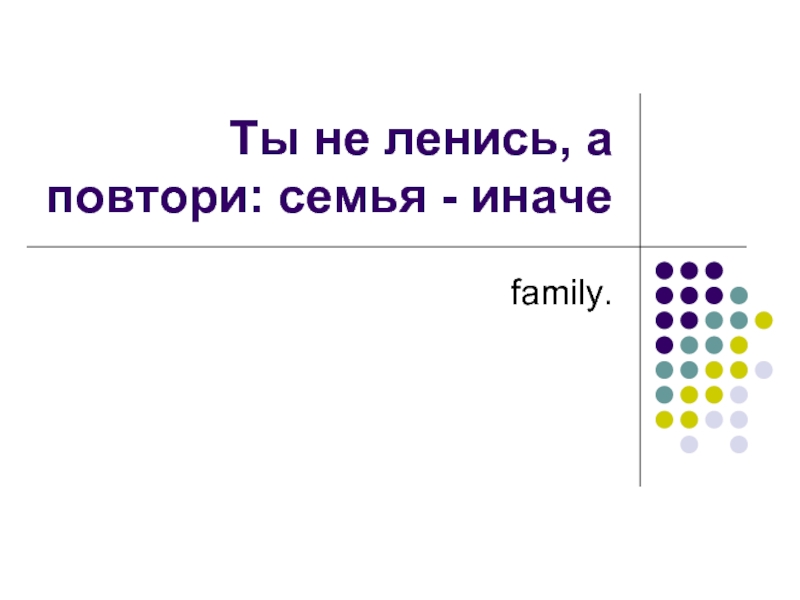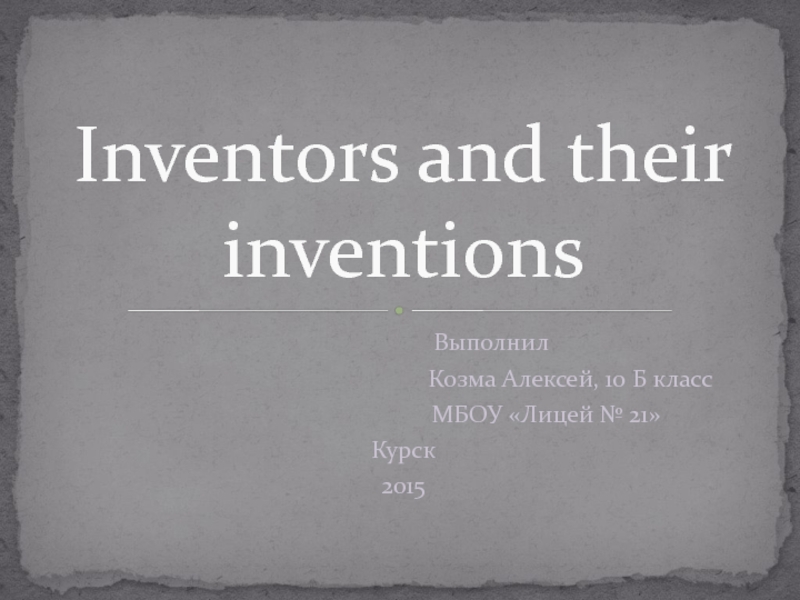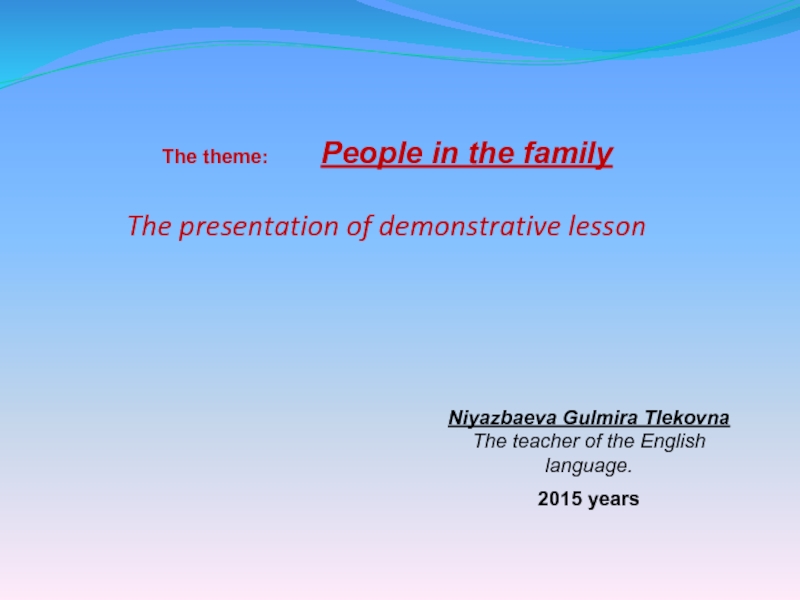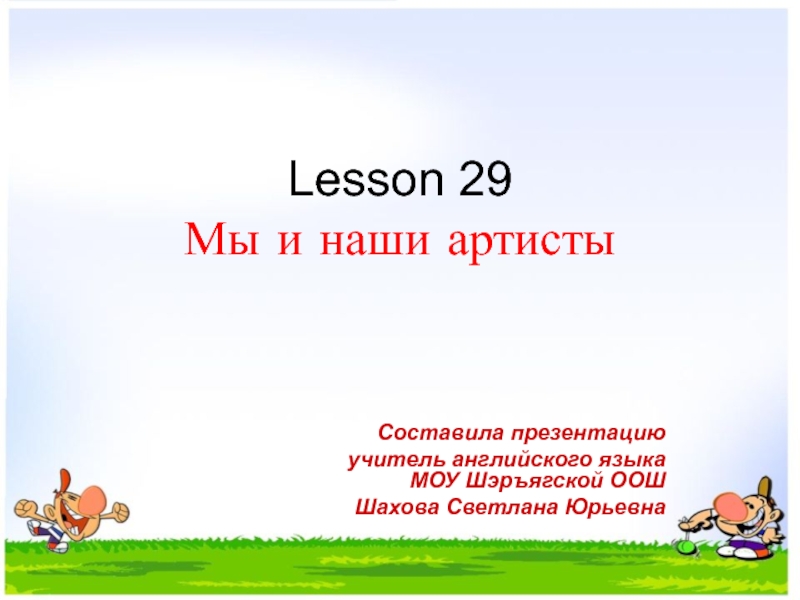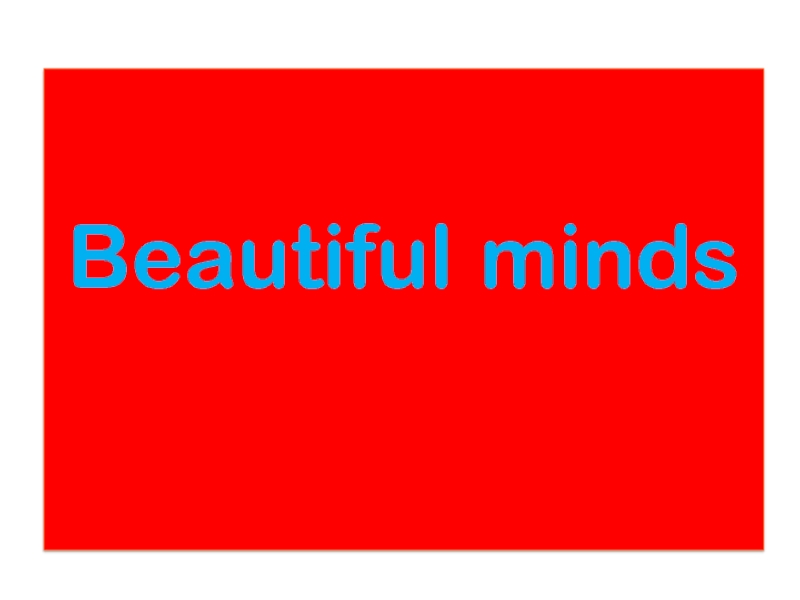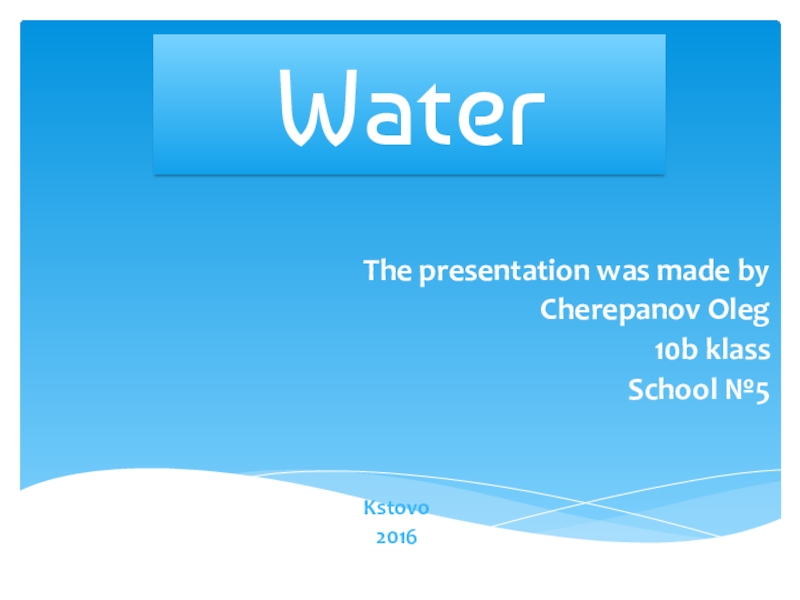Разделы презентаций
- Разное
- Английский язык
- Астрономия
- Алгебра
- Биология
- География
- Геометрия
- Детские презентации
- Информатика
- История
- Литература
- Математика
- Медицина
- Менеджмент
- Музыка
- МХК
- Немецкий язык
- ОБЖ
- Обществознание
- Окружающий мир
- Педагогика
- Русский язык
- Технология
- Физика
- Философия
- Химия
- Шаблоны, картинки для презентаций
- Экология
- Экономика
- Юриспруденция
"Teaching young learners"
Содержание
- 1. "Teaching young learners"
- 2. By the end of this workshop, you
- 3. So what do you know about
- 4. Preview: Characteristics of Young LearnersThink-Pair-ShareIn thinking back
- 5. For a minute, close your eyesand imagine
- 6. Characteristics of young learners
- 7. 1.Ways of learning :Age 5-8Prefers to learn
- 8. 2. Reasons for learning:Age 5-8Enjoys new experiences
- 9. 3. Physical development:Age 5-8Has lots of energy
- 10. 4. Emotional development:Age 5-8Feeling change frequently.Has difficulty
- 11. 5.Social development:Age 5-8Thinks more about himself/herself than
- 12. 6.Thinking ability:Age 5-8Has difficulty understanding consequences.Can understand
- 13. 7.Attention span:Age 5-810-15 minutesAge 9-1020-30 minutes
- 14. 8.Study skills:Age 5-8Somewhat passive. May not look
- 15. 9. World knowledge:Age 5-8Limited; may have difficulty
- 16. 10.Ability to learn abstract ideas.Age 5-8Learns best
- 17. The child’s learning Children perceive the world
- 18. Слайд 18
- 19. Слайд 19
- 20. Why?1.Difficult for 5-6 because it requires ability
- 21. Why?4.Young learners can tell or listen to
- 22. Why?7.Difficult for 5-6 because of difficulty planning
- 23. Why?11.Best for older learners; they can plan12.
- 24. Why?14.Older learners can plan and work with
- 25. Слайд 25
- 26. Strategies for Teaching Young LearnersWhat happens when
- 27. Group Activity 4In your small groups, develop
- 28. The Child's Learning Strategies The child in
- 29. Teaching YL with ICTExpert on colorsToys game
- 30. So what have you learned?LSo what will you take away from this workshop?Yay, we’re finished…Thanks!!
- 31. Скачать презентанцию
Слайды и текст этой презентации
Слайд 1Teaching
Young Learners
"Free the child's potential, and you will transform
him into the world."
- Maria Montessori
Слайд 2By the end of this workshop, you will….
identify characteristics
of young learners
identify and develop activities that are appropriate
for different ages of young learners and justify your answerscompare and contrast strategies
for teaching different age groups
identify strategies for young learners
and determine their efficacy based
on age
…the power to learn languages is so great in the young child that it doesn’t matter how many languages you seem to throw their way…Children can learn as many languages as you can allow them to hear systematically and regularly at the same time
--Dr. Susan Curtiss, Professor of Linguistics at UCLA
Слайд 3 So what do you know about teaching young learners?
K-W-L
So what do you want know about teaching young learners?
What
the experts know is that since a child’s ability to communicate orally in his/her first language takes place before learning how to read and write, an effective EFL program for young learners should go through the natural stages of learning a language….Basic oral/aural developmentEmergent literacy skills Reading & writing
Слайд 4Preview: Characteristics
of Young Learners
Think-Pair-Share
In thinking back to your teaching
experiences:
What ways are 5-8 year olds the same as 9-10
year olds?2. How are they different?
VS.
Слайд 5For a minute, close your eyes
and imagine you are teaching
a class of….
five-year-olds
eight-year-olds
ten-year-olds
1. With your designated,
group describe your students in these areas:emotional development
social development
physical development
thinking development
2. Now compare your answers with those from the chart (handout)
Group Activity 1
Слайд 71.Ways of learning :
Age 5-8
Prefers to learn by touching or
holding things or moving
Age 9-10
Learners begin to develop the
ability to learn by seeing or listening Слайд 82. Reasons for learning:
Age 5-8
Enjoys new experiences
Begins to be
interested in specific themes or topics.
Likes fun and adventure.
Likes praise
and have attention of adults.Wants to please adults.
Age 9-10
Is motivated to learn things that are interesting to them.
Likes to memorize and learn new information.
Wants to understand why things happen.
Слайд 93. Physical development:
Age 5-8
Has lots of energy and is very
active.
Is developing but may have difficulty with tasks like writing.
Age
9-10Can do precise tasks and has developed the ability to do physical activities like sports or game.
Слайд 104. Emotional development:
Age 5-8
Feeling change frequently.
Has difficulty controlling his/her behavior
Age 9-10
Is independent and likes to do things for himself/herself
.Will do things without being asked.
Слайд 115.Social development:
Age 5-8
Thinks more about himself/herself than others.
Likes to work
in groups but needs supervision.
May have difficulty expressing or understanding
feelings Age 9-10
Begins to think about and understand relationships with others.
Likes to work with other learners.
Слайд 126.Thinking ability:
Age 5-8
Has difficulty understanding consequences.
Can understand the main idea
but has difficulty identifying steps or details.
Has difficulty planning ahead.
Age
9-10Can classify things using simple characteristics.
Understands cause and effects.
Knows strategies that can be used to solve problems or learn (for example, asking for help, taking notes).
Can identify similarities and differences.
Слайд 148.Study skills:
Age 5-8
Somewhat passive. May not look for opportunities to
learn.
Age 9-10
Active learners; want to know more about the
world Слайд 159. World knowledge:
Age 5-8
Limited; may have difficulty understanding things outside
of their experience or beyond their community.
Age 9-10
Learners are
curious about the world and are developing a greater understanding of things beyond their family and community.Слайд 1610.Ability to learn abstract ideas.
Age 5-8
Learns best when new information
is presented in a context and connected something that is
familiar for them.Age 9-10
Begins to understand things, which s/he can’t see.
Can understand abstract ideas.
Слайд 17The child’s learning
Children perceive the world holistically
Child should
get the integral picture of the world
The learning content
should be contextualized, communicative and meaningful and reflect cross-cultural perspectives. Слайд 20Why?
1.Difficult for 5-6 because it requires ability to identify details
2.Simple tests can be used with older learners
3.Use poems appropriate
to lg. competency Слайд 21Why?
4.Young learners can tell or listen to story; older, can
tell stories (historical or scientific)
5.Use songs appropriate to lg. competency
6.Difficult for 5-6 without reading skills
Слайд 22Why?
7.Difficult for 5-6 because of difficulty planning
8.
9.5-6 may
have difficulty identifying categories
10.Younger learners may have difficulty identifying a
sequence of events Слайд 23Why?
11.Best for older learners; they can plan
12.
13.Younger learners may
have trouble identifying sequence of events
Слайд 24Why?
14.Older learners can plan and work with others
15.Can be boring
for older students
16.Too abstract for children
Слайд 26Strategies for Teaching Young Learners
What happens when teachers use inappropriate
activities with their students? Why?
1. Use teaching aids: chalkboard picture,
big books, puppets, realiaWhy is this good for young learners?
2. Use short and varied activities
How can the teacher vary activities? Name a few….
3. Present new information in contexts that are connected with learners’ lives
Why is this important?
4. Teach in themes
Why?
5. Establish classroom routines
Why?
6. Give learners the opportunity to move
Why?
7. Make the classroom rich and interesting
Why is this important?
Group Activity 3- In your groups answer the following questions:
Слайд 27Group Activity 4
In your small groups, develop an activity according
to various themes and determine why they are appropriate for
young learnersReport out to the group
Слайд 28The Child's Learning Strategies
The child in NOT INTERESTED IN LANGUAGE
for its own sake.
The child is NOT DISTURBED by the
language he does not understand.The child ENJOYS THE REPETITIVE events of his life, and uses this enjoyment to help him learn.
The child USES HIS PRIMARY INTERESTS to help him learn.
The child directs his attention to things that are EASY TO UNDERSTAND.
The child possesses a natural desire TO CALL AN OBJECT BY ITS NAME.
The child uses his natural desire TO PARTICIPATE IN THE LIFE AROUND HIM to help him learn new language.
The child adds words to his speaking vocabulary more easily IF HE ALREADY KNOWS HOW TO PRONOUNCE THEM.
The child IMMEDIATELY USES the language, and his SUCCESS IN COMMUNICATION BUILDS CONFIDENCE.
The child brings TREMENDOUS INGENUITY to the task of learning.
Child should get the INTEGRAL picture of the world
The learning content should be CONTEXTUALIZED, COMMUNICATIVE and MEANINGFUL and reflect cross-cultural perspectives.

